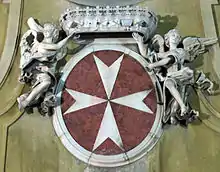Anne-César de La Luzerne
Anne-César de La Luzerne (1741–1791) was an 18th-century French soldier and diplomat. Descended from an illustrious Normandy family, as a Knight of Malta and the Order of Saint Louis he was styled Chevalier before King Louis XVI created him a Marquis in 1785.


Biography
Born on 15 July 1741 in Paris, his father was César Antoine de la Luzerne, comte de Beuzeville (died 1755), a Maréchal de camp in the king's army, and his mother was Marie-Elisabeth de Lamoignon de Blancmesnil[1] (1716-1758), the daughter of Lord Chancellor Lamoignon and the sister of the Secretary of State Malesherbes. Anne-César's brothers were César Henri, comte de La Luzerne, Naval Minister and Cardinal La Luzerne.
Anne-César de La Luzerne joined the French Royal Army in 1754 and served with distinction during the Seven Years' War. He commanded the Grenadiers royaux de France, reaching the rank of Major-General in 1762.
He entered diplomatic service as French Minister Plenipotentiary, first to Bavaria (1777-1778), and then in the United States.
Minister to the United States
In 1779 La Luzerne succeeded Conrad Alexandre Gérard de Rayneval as the French Minister to the United States and later served as the official Ambassador of France until 1784.[1] During his time in Philadelphia he never failed to show his sympathy for the young Republic. He even guaranteed a personal loan, much needed to furnish food for the troops in 1780; and in return he obtained, in 1782, the agreement that the American Continental Congress should not ratify any peace treaty with Great Britain until agreement was reached between France and Britain. He also arranged for a requiem Mass after the death of Juan de Miralles (a Spanish representative to the Continental Congress), at St. Mary's Church in Philadelphia on 8 May 1780.
La Luzerne was a major proponent of ratification of the Articles of Confederation; he felt that this new form of government would help strengthen the American state. Maryland persisted in being the only state to block ratification of the Articles; their holdout was that some states had not yet given up claims to land west of the Appalachian Mountains. When Maryland requested France provide naval forces in the Chesapeake Bay for protection from the British (who were conducting raids in the lower part of the bay), he indicated that French Admiral Destouches would do what he could but La Luzerne also "sharply pressed" Maryland to ratify the Articles, thus suggesting the two issues were related. Maryland ratified the Articles in February 1781.[2] La Luzerne also suggested that the Confederation government appoint ministers of war, finance and foreign affairs. He was assisted by General and Congressman John Sullivan[3]
He returned to Europe in 1784, his reputation as an envoy much enhanced. In 1789, Thomas Jefferson, the first U.S. Secretary of State, sent La Luzerne a letter of thanks on behalf of President George Washington. In 1788 he was posted as Ambassador to the Court of St. James's in London, and died on 14 September 1791 at Southampton.
In 1781 he had been elected an Honorary Fellow of the American Academy of Arts and Sciences,[4] and in 1783 he was a founding Fellow of the Society of the Cincinnati. Luzerne County, Pennsylvania, and Lake Luzerne, New York, are named after him.
See also
Notes
- www.jeanmariethiebaud.com
- Sioussat, St. George L. (October 1936). "THE CHEVALIER DE LA LUZERNE AND THE RATIFICATION OF THE ARTICLES OF CONFEDERATION BY MARYLAND, 1780-1781 With Accompanying Documents". The Pennsylvania Magazine of History and Biography. 60 (4): 391–418. Retrieved 19 April 2018.
- Tom Shachtman. How the French Saved America. pp. 243–244.
- "Book of Members, 1780–2010: Chapter L" (PDF). American Academy of Arts and Sciences. Retrieved 28 July 2014.
References
- Modified from New American Supplement to the New Werner Twentieth Century Edition of the Encyclopædia Britannica; Vol. XXVI, p. 651 (1905, public domain).
- La Luzerne, Anne Cesar, Encyclopedia.com
External links
| Wikisource has the text of a 1905 New International Encyclopedia article about "Anne-César de La Luzerne". |